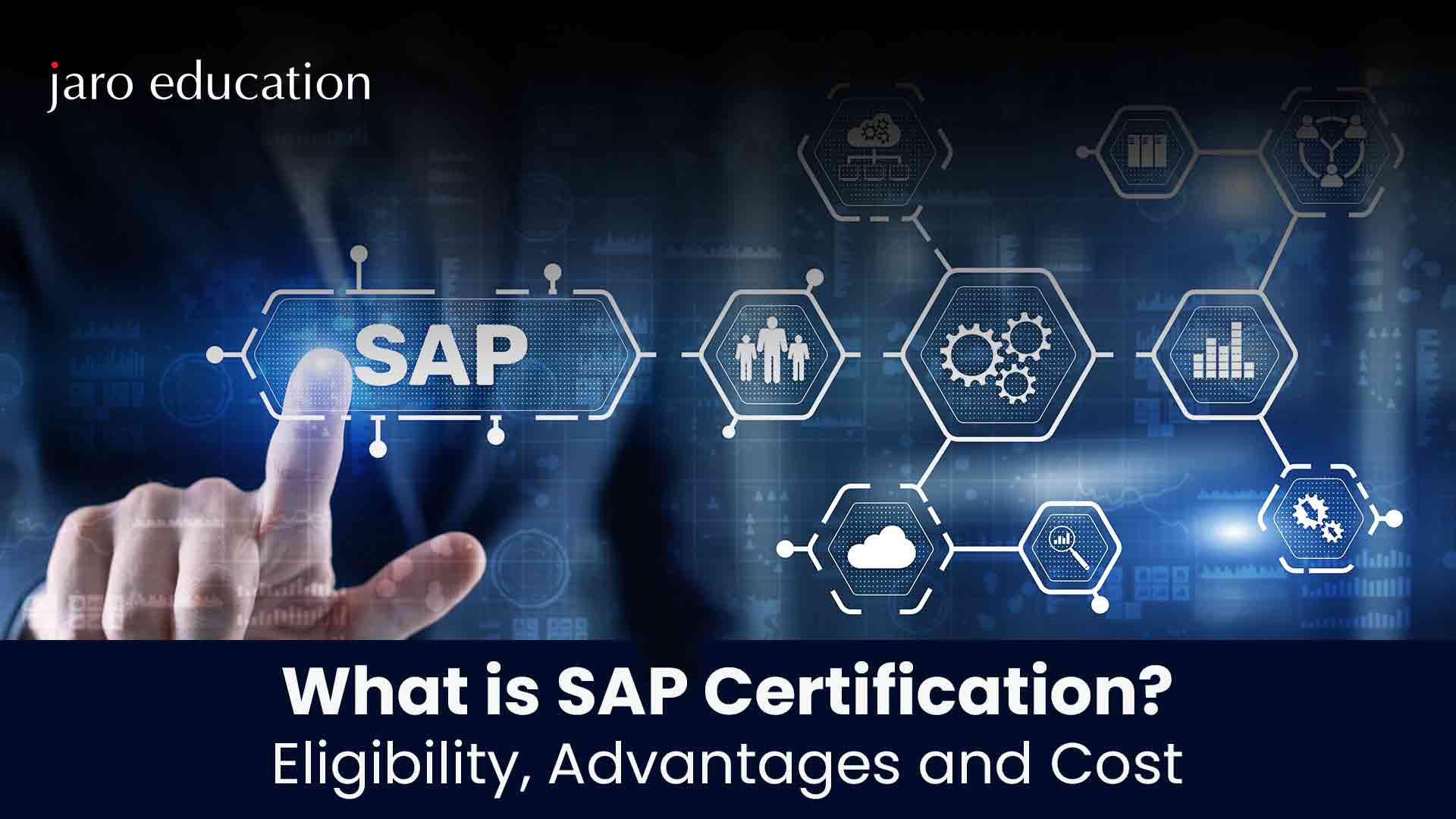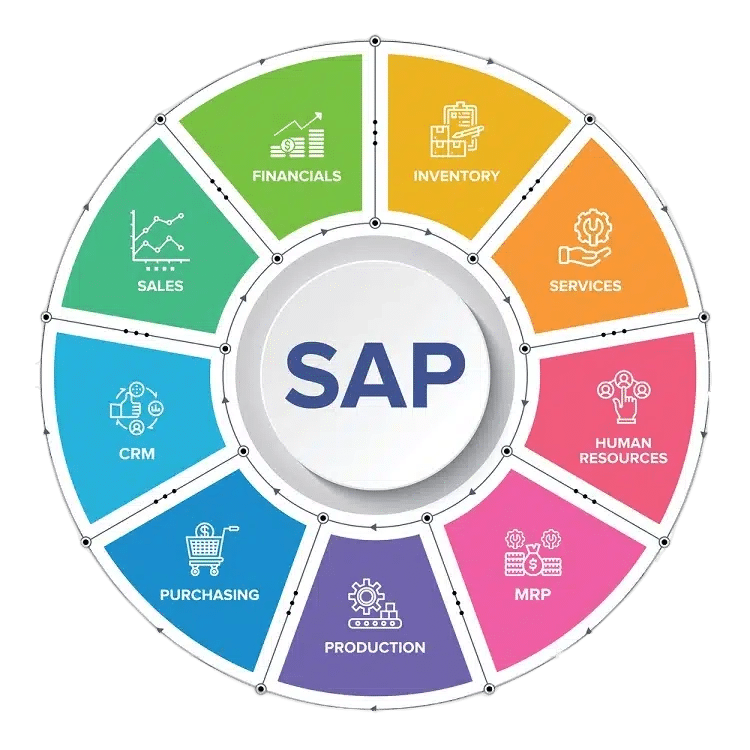
- jaro education
- 24, May 2024
- 4:17 pm
Have you heard about SAP certification but aren’t sure what it entails? In simple terms, SAP certification is like getting a stamp of approval for your skills in using SAP software, which businesses rely on for managing their operations.
This blog is here to clear up any confusion. We’ll start by explaining who can pursue SAP certification and why it’s valuable. Then, we’ll talk about the perks it brings, like better job opportunities. Finally, we’ll break down the costs involved, helping you decide if it’s worth the investment.
Let’s break down SAP certification together, helping you understand it better and make smart decisions about your career in enterprise solutions. SAP Certification validates your expertise in using Systems, Applications, and Products in Data Processing (SAP). These certifications cover a wide range of topics, from managing HR software to handling databases and understanding business processes. You can pursue SAP certification independently or as part of a degree program.
As SAP continues to evolve with new e-business applications and tools for functions like supply chain management and customer relations, the importance of SAP certification has grown.
Table of Contents
SAP systems are comprehensive, integrating modules that cover nearly every aspect of business management.
Having an SAP certification is not just beneficial locally; it also opens doors internationally as SAP frameworks are widely adopted worldwide. SAP is a globally recognized platform, especially in areas like Financial Accounting and Controlling (FICO), Production Planning (PP), and Materials Management (MM). The demand for SAP experts is rising across various industries, making SAP certification valuable for both operational and managerial roles.

*futurelabstechnology
SAP Course Eligibility and the Range of Courses Available
The eligibility criteria for SAP certification vary depending on the specific course or module you’re interested in and the skills you possess. It’s advisable to have a relevant academic background in fields such as Computer Science, Business Administration, Finance, Accounting, Human Resources, Information Systems, Operations Management, or Systems Engineering.
SAP certification offers a diverse range of courses, categorized into functional and technical tracks. The choice between these tracks depends on your educational background and career aspirations. Functional courses focus on understanding business processes and operations, while technical courses delve into programming and module customization.
However, there are roles that require a combination of both functional and technical skills, such as business analysts.
The discussion on SAP certification and the importance of a relevant academic background highlights the need for continuous learning and specialization in one’s career. Similarly, the Executive Certificate Program by Advanced Project Management and Analytics – IIM Mumbai offers a pathway for professionals to deepen their expertise not just in managing projects, but in leveraging data analytics for strategic decision-making.
There are no specific prerequisites in terms of courses required before taking the certification exam. However, for higher-level Professional Certification, having an Associate level Certification is typically necessary. SAP certifications are valuable validations of expertise and experience for SAP partners, software users, customers, and professionals seeking roles within SAP environments. These certifications are globally recognized and serve as a standardized benchmark for various roles and responsibilities in the SAP ecosystem.
Types Of SAP Courses
There are various types of SAP courses available based on roles, industries, and types. The following are some of the primary types:
1. Functional SAP Courses
These courses focus on the functional aspects of various SAP modules such as Financial Accounting, Controlling, Material Management, Sales and Distribution, Human Capital Management, Production Planning, and more. Functional courses help you learn how to configure and work on SAP software according to specific business processes.
2. Technical SAP Courses
Technical courses are based on programming and technical customization in SAP systems. This may include SAP ABAP for custom reporting and application development, SAP Basis for system administration, SAP HANA for in-memory database, SAP UI5 for user interface development, and more.
3. Industry-Specific SAP Courses
These courses are intended for different industry segments like retail, healthcare, manufacturing, banking, and more. They help professionals understand industry-specific processes and practices through SAP solutions to handle industry-specific requirements and hurdles.
4. Integration SAP Courses
These courses teach how to integrate SAP systems with other applications and technologies. This includes SAP Integration with Cloud Platforms, IoT integration, BI tools integration for data analysis, and reporting.
5. Business Analytics SAP Courses
Business Analytics courses are focused on using SAP solutions to analyze data and business intelligence, generate reports, and create dashboards. They include BW for data warehousing, BO for editing and visualization, and Analytics Cloud for analytics and predictive modeling.
6. Cloud-Based SAP Courses
SAP has developed many cloud solutions focusing on providing remote solutions. This includes SAP S/4HANA Cloud, SAP SuccessFactors, SAP Ariba, and SAP Customer Experience solutions.
7. Developer SAP Courses
Developer courses are intended for developers and programming professionals. Advanced topics like SAP Fiori, SAP Mobile Development, SAP Cloud Platform-based developments, and Leonardo are part of this type.
What are SAP Course Benefits?
Let’s delve deeper into the benefits of undertaking a SAP course:
1. Industry-Recognized Certification
Completing an SAP course not only provides you with valuable knowledge and skills but also leads to obtaining a certification that is widely recognized and respected in the industry. This certification serves as concrete proof of your proficiency in using SAP software, making you a highly desirable candidate for employers seeking SAP expertise.
2. Career Advancement Opportunities
Equipping yourself with SAP skills and certification opens up a plethora of career advancement avenues. You become eligible for higher-level positions such as SAP consultant, business analyst, project manager, or system administrator. These roles not only come with increased responsibilities but also offer better salary prospects and opportunities for professional growth, including leadership roles and specialized positions.
3. Increased Employability
In today’s digital age, many organizations rely on SAP software to streamline their business processes and enhance efficiency. As a result, professionals with SAP skills are in high demand across various industries, including finance, manufacturing, healthcare, retail, and consulting. Completing a SAP course significantly enhances your employability, making you a sought-after asset for companies looking to leverage SAP solutions effectively.
4. Specialized Knowledge
SAP courses provide comprehensive training and insights into specific SAP modules, functionalities, and best practices. This specialized knowledge equips you with the ability to configure, implement, and optimize SAP systems tailored to meet the unique needs and objectives of different businesses. You gain expertise in areas such as Financial Accounting and Controlling (FICO), Production Planning (PP), Materials Management (MM), Sales and Distribution (SD), Human Capital Management (HCM), and more, making you a competent SAP professional capable of addressing complex business challenges.
5. Enhanced Problem-Solving Skills
SAP courses often include practical exercises, case studies, and hands-on projects that simulate real-world scenarios. Engaging in these activities hones your problem-solving skills, enabling you to identify issues, analyze data, and devise effective solutions within the SAP environment. This practical experience is invaluable for your professional development and prepares you to tackle complex business problems with confidence and efficiency.
6. Networking Opportunities
Attending SAP courses provides you with valuable networking opportunities. You interact with fellow professionals, industry experts, and experienced instructors who can offer insights, advice, and potential job referrals. Building a strong professional network enhances your career prospects and opens doors to collaboration, mentorship, and partnership opportunities, facilitating your growth within the SAP community and beyond.
7. Adaptability to Technological Changes
SAP is a dynamic platform that continually evolves with technological advancements. By enrolling in SAP courses, you stay updated with the latest trends, updates, and innovations within the SAP ecosystem. This adaptability to technological changes ensures that you remain competitive in the job market and can leverage new features, functionalities, and integrations for business success. You learn about emerging technologies such as SAP S/4HANA, cloud computing, artificial intelligence (AI), machine learning (ML), Internet of Things (IoT), and blockchain, enhancing your skillset and future-proofing your career.
8. Global Job Market Access
SAP skills are highly transferable and recognized globally. Completing a SAP course expands your job opportunities beyond your local market, allowing you to explore roles in different industries, organizations, and countries. Many multinational corporations prefer candidates with SAP expertise, giving you access to a broader and more diverse job market. Whether you aspire to work locally or internationally, having SAP certification increases your global job market access and positions you as a competitive candidate in the global economy.
Salary Outlook for SAP Professionals
Senior-level SAP functional consultants with more than five years of experience command a competitive average annual salary ranging from approximately ₹12,00,000 to ₹25,00,000. This translates to a monthly income averaging between approximately ₹1,00,000 and ₹2,08,333. The high demand for seasoned SAP consultants, their pivotal leadership roles, and their significant contributions to digital transformation initiatives are key factors driving this lucrative salary range.
Cost of SAP Certification
The price of SAP Certification can fluctuate significantly based on various factors such as the region, the certification type, and the necessity for additional training modules. Typically, in the United States, the cost of an SAP Certification exam ranges from $500 to $750 on average. It’s important to note that this fee does not cover preparatory courses or study materials, which can substantially raise the total investment. SAP provides bundled packages that combine training sessions with certification exams, offering a more cost-effective alternative for many prospective candidates.
Conclusion
SAP Certification stands as a valuable asset for professionals seeking to establish or enhance their careers within the SAP ecosystem. It not only validates technical skills and knowledge but also paves the way for new career opportunities, potential salary increases, and professional development. Despite the initial cost investment, the long-term benefits often outweigh these expenses.
For those aiming to elevate their careers, delving into courses provided by top-tier universities through Jaro Education is a strategic move. aro Education’s unique provision of complimentary career guidance is an invaluable asset in navigating the complexities of professional growth. Leveraging this support not only equips you with the latest skills but also empowers you to stay ahead in the dynamic field of UI development, where staying relevant is key to success.









